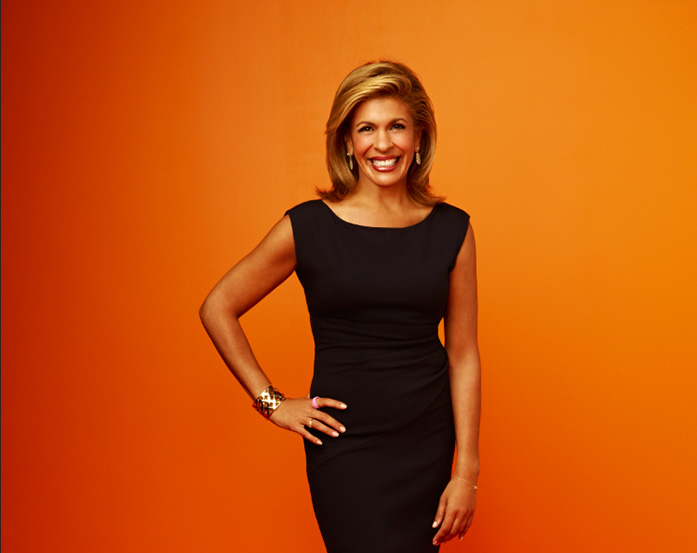Hoda Kotb’s Where We Belong tells the story of six people and the struggles they faced trying to find themselves and looking for a place in which they truly belong.The Daily Iowan recently spoke with Kotb about her upcoming book and about what it means for people to find their metaphorical home.
Daily Iowan: What inspired this book?
Hoda Kotb: I feel like we all have a place we’re supposed to be, a job we’re supposed to be in, a person we’re supposed to be with, a place you’re supposed to live. And sometimes, we wonder if we’re really there, and I think you know when you have that feeling. When some people go to Paris for the first time, and they feel like they have a warmth in the heart.
Or someone does something, and looks up at the clock, and says, “Oh my gosh, it’s 4 o’clock.” Whatever that something is you’re doing is something you should try to figure out how to carve into a profession.
And I’ve always been in awe of people who have found that sweet spot. And you can tell, because there’s this peacefulness about them, they’re not fighting, they’re not swimming upstream, they’re riding the waves. And that’s what really inspired me.
DI: Why these stories in particular? How did you become aware of them?
Kotb: We were looking for people who fit different moments in life. Some people are looking for the right profession, and some people are looking to find out if they’re fulfilled where family is concerned. Some are concerned if they’re fulfilled where fate is concerned and on and on and on.
And so we went looking online for people who were interesting. Obviously, we didn’t want them all to be the same category, so we could get a bit of everything. It was just a wide net; there’s no rhyme or reason. It’s more of, ‘Oh, look at this one. And this one.’ And then some would fall out because it doesn’t have enough layers, and we just boiled it down to this select group of people that covered everything, pretty much, in terms of people who were at different stages in their lives in trying to find their way.
DI: Why a book? You have so many media options to choose from, why did you choose a book?
Kotb: I think you want something you can carry with you. It’s one of those things that you can pass on to other people and say, “Oh my gosh, look at this college grad. I know you just graduated, take a peek at this book.” I read a lot of my books on my iPad, but these aren’t magazine-like stories. These aren’t stories you get when you open the pages of *Glamour*. And that’s interesting. These have just more to it than that.
DI: Why publish these stories now?
Kobt: I think with the new year, we always take a step back to look at ourselves. We look around and say, “Wow, I wonder if I’m on the right path.” It’s a time of rebirth, to recalibrate and look ahead, and look at the stuff that’s going on in my life right now. People make resolutions, and they start trying to make changes in life. And I thought with the new year, new you, it was a good time for this to come out. You don’t know … What’s your major in college?
DI: Me? English and journalism.
Kotb: OK, you’re English and journalism and what job do you want?
DI: I want to write; I haven’t worked out much else after that.
Kotb: So you want to be a writer. Let’s pretend you get a job and you’re writing for something that feels like it might be a fit. You get to write, but you don’t get to write exactly what you want.
As you get older, you’ll say, “Do you know what I love to write? I love to write about travel. And I want to work for the Travel Channel and write and travel that way.” Or you might say, “Oh my gosh, I want to inspire people, and I want to lift others up. So I’m going to meet a million people, and do all kinds of research, and write that.” Or, “I like breaking news, and I’m going to chase it down.”
You’ll figure it out as you go. I think as you go through life for any of us, you start going, “Wait. Actually, it turns out I like writing, but I like blank even more.” And we can try things.
I think the important thing to know about life is that you can make other choices. I’m not encouraging people to quit their jobs and chase their dreams, because people need to pay rent, people need to have insurance, people need to pay their bills. People can’t do that. But what you can do is put 10 percent of your time and 10 percent of your money towards the thing you love. And then at least you don’t feel like you’re drowning while you’re working on the railroad, doing your job.
And then next year, you might be able to put 15 percent of your time and 15 percent of your money into it, and maybe it goes higher than that. And maybe one day your passion will become your job; you find a way to make it work. I think there are ways to do it without up and leaving something.
DI: Above all else, what do you hope readers will get from reading this book?



